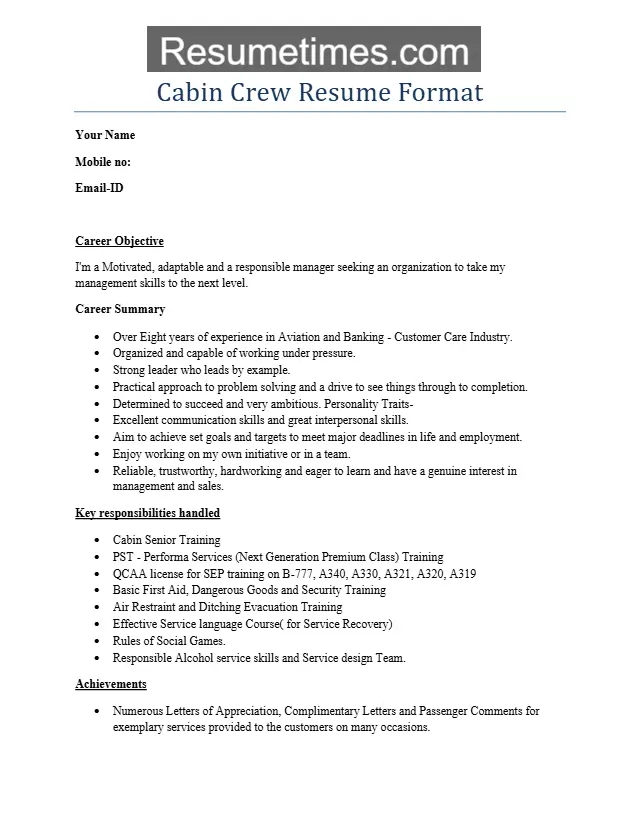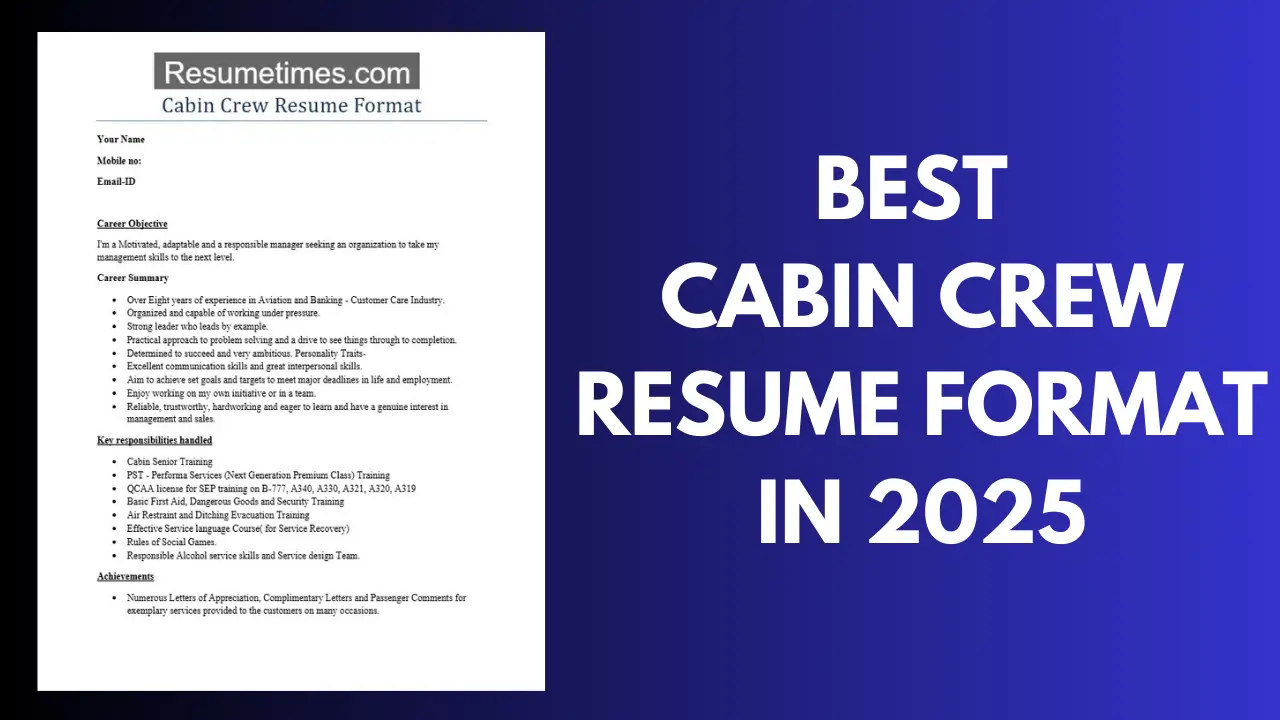Starting a career as a cabin crew member is exciting and challenging. Having a strong resume is key to getting a good job. Your resume is your chance to show airlines why you would be a great cabin crew member. It should be easy to read and highlight your skills, experience, and personality. This guide will help you create a clear and impressive Cabin Crew Resume Format.
A resume is your first chance to make a good impression. It shows your skills, education, and experience. A strong resume can:
- Impress employers.
- Highlight your abilities.
- Set you apart from other candidates.
This guide will explain the important parts of a cabin crew resume, give tips on highlighting your strengths, and help you avoid common mistakes.
Why is a Resume Important for Cabin Crew?
A cabin crew resume is a document that shows your education, skills, and experiences relevant to working as a flight attendant. It is important for job seekers to present their qualifications clearly and effectively.
New cabin crew members often face challenges like limited work experience and tough competition. A good resume can help by highlighting your skills and relevant achievements.
A strong resume can make a big difference in getting interviews and job offers. It shows your potential to employers, making them more likely to consider you for flight attendant positions.
Must Read – Best Air Hostess Resume For Freshers in India
Cabin Crew Resume Format

How To Write A Cabin Crew Resume
A good cabin Cabin Crew Resume format should include the following sections:
- Contact Information
- Professional Summary
- Skills
- Work Experience
- Education
- Certifications
- Languages
- Hobbies and Interests
Contact Information
What to Include
- Full Name
- Phone Number
- Professional Email Address
- LinkedIn Profile (optional but helpful)
Tips for Contact Information
Make sure your email address is professional and avoid using nicknames. Also, ensure your social media profiles are appropriate and show a professional image.
Professional Summary or Objective Statement
Differences Between a Summary and an Objective Statement
- Professional Summary: Gives a brief overview of your skills and experiences.
- Objective Statement: Focuses on your career goals and what you want to achieve in the role.
Examples of Cabin Crew
Professional Summary:
Friendly and dedicated cabin crew member with strong customer service skills and a focus on passenger safety. Experienced in handling in-flight emergencies and providing top-notch service.
Objective Statement:
Seeking a cabin crew position where I can use my excellent communication and problem-solving skills to ensure passenger comfort and safety.
Education
How to List Educational Qualifications
- List your highest qualification first.
- Include the name of the institution, degree obtained, and graduation date.
- Mention relevant coursework or projects.
Work Experience (if any)
Structuring Descriptions of Previous Jobs
- Highlight your responsibilities and achievements.
- Use bullet points for clarity.
Highlight Your Skills
- Focus on skills like customer service, teamwork, and problem-solving, even if your previous jobs were not directly related to being a cabin crew member.
Skills Section
Listing Skills
Include a mix of hard skills (safety procedures) and soft skills (personal qualities).
Examples of Relevant Skills
- Knowledge of safety procedures
- Excellent communication skills
- Strong customer service skills
- Ability to handle emergencies
- Teamwork
Additional Sections to Enhance Your Resume
Certifications and Training
- Importance: Certifications can make your resume more attractive to employers.
- Examples: CPR Certification, and Cabin Crew Training Certificate.
Extracurricular Activities and Volunteering
- How to Present: Include activities that show leadership or teamwork skills.
- Examples: Volunteering in community service, and participating in sports teams.
Tips for Cabin Crew Resume Format
- Use action verbs like “assisted,” “managed,” “coordinated,” and “ensured.”
- Spelling and grammatical errors: Proofread your resume multiple times.
- Using unprofessional email addresses: Ensure your email is professional.
- Including irrelevant information: Focus on relevant details.
- Making the document too long: Keep your resume concise, ideally one page for new cabin crew members.
- Use a clean, professional font like Arial or Times New Roman.
- Use Bullet Points: They make your resume easy to read.
Conclusion
By following this guide, you can create a Cabin Crew Resume Format that highlights your strengths and improves your chances of getting a job. Continuously update your resume based on feedback from recruiters or mentors, and stay committed to your professional growth.
